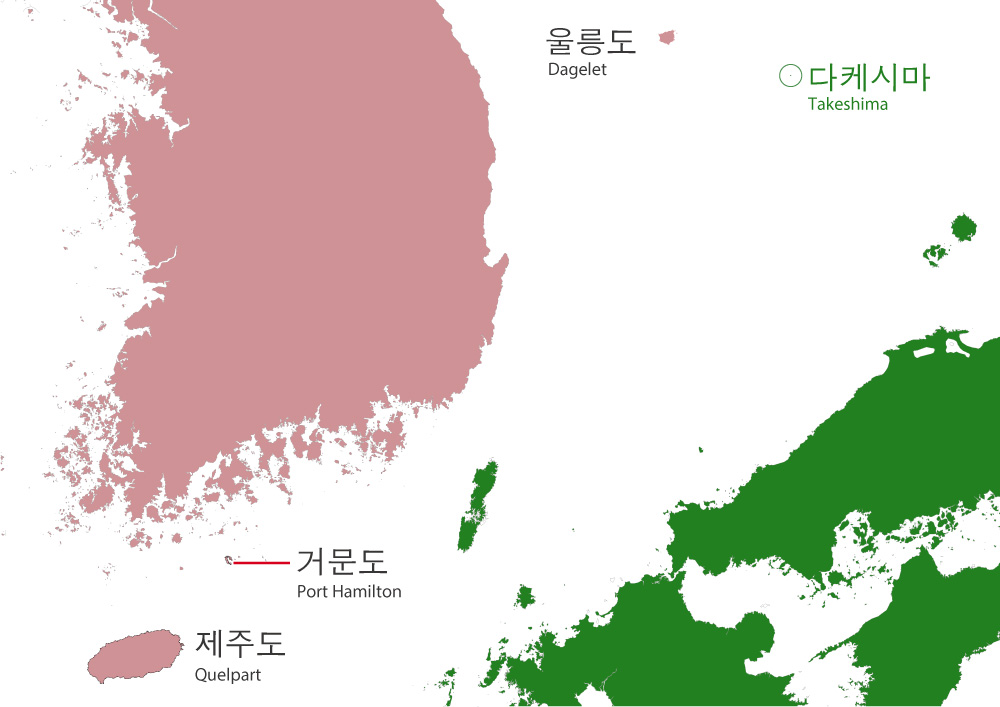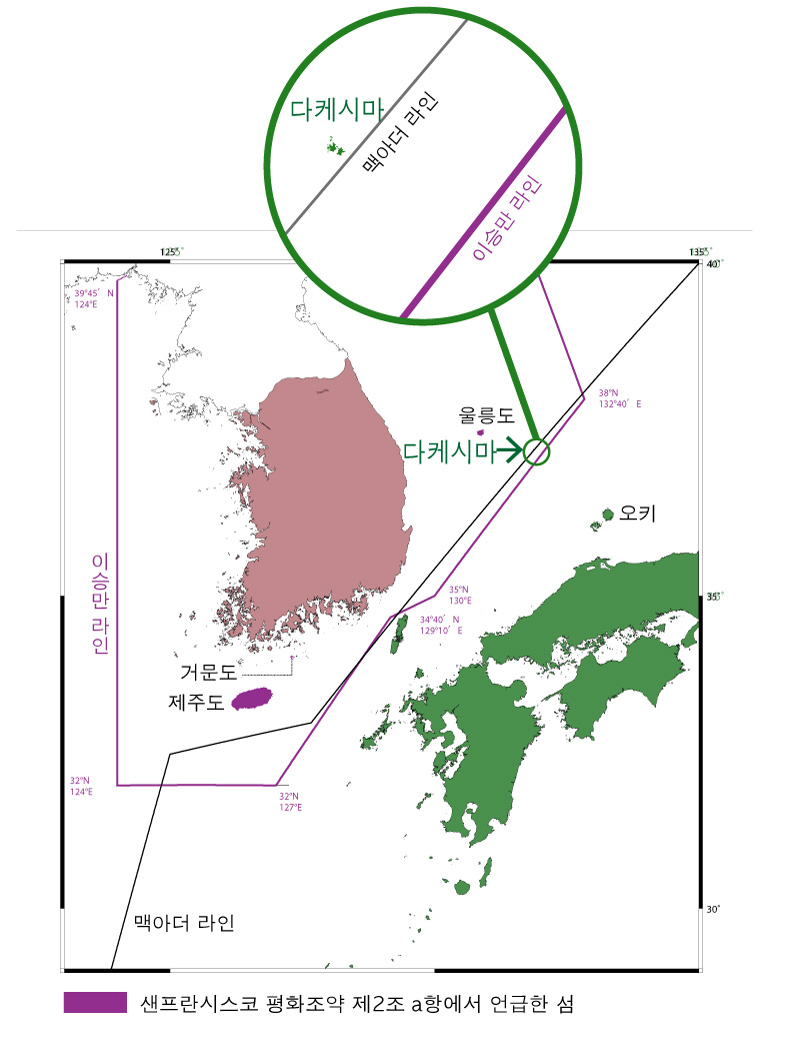샌프란시스코 평화조약 서명 ・ 발효와 한국이 취한 행동
1951년 9월 8일
샌프란시스코 평화조약 서명
혼슈, 홋카이도, 규슈, 시코쿠 이외의 일본의 섬들이 결정됐다.
샌프란시스코 평화조약
제2장(영역)
제2조
(a)일본은 조선의 독립을 인정하고, 제주도, 거문도 및 울릉도를 비롯한 조선에 대한 모든 권리와, 소유권 및 청구권을 포기한다.

한국의 움직임
1952년 1월 18일
한국 대통령이 ‘해양 주권 선언’
해양주권 선언에 대한 미국의 항의
미국은 한국에 대해 한국의 해양주권 선언이 모든 국가에 인정되는 공해상의 권리를 침해한다고 깊은 염려를 보이며 이런 선언이 인정된다면 모든 국가가 일방적으로 선언을 발표하는 것으로 공해를 영역에 전환할 수 있게 된다는 사실을 지적했다.
미국의 항의
자료 발췌
No. 167
American Embassy,
Pusan, February 11, 1952.
Excellency:
I have the honor to advise Your Excellency that the Government of the United States of America has taken note of the Proclamation issued by the President of the Republic of Korea on January 18, 1952 regarding Korean sovereignty over the continental shelves and certain water areas adjacent to the mainland and insular coasts of the Republic of Korea.
I am directed to inform Your Excellency that the Government of the United States of America regards with deep concern the provisions of this Proclamation. If carried into execution, this Proclamation would bring within the exclusive jurisdiction and control of the Republic of Korea wide ocean areas which have hitherto been regarded as high seas by all nations, and would in these waters and in the air spaces above supplant the free and untrammeled navigation of foreign vessels and aircraft bb such controls as the Republic of Korea, in the exercise of the sovereignty claimed, might apply. The disclaimer in Paragraph 4 does not lessen the concern of the United States Government since by the assertion of sovereignty, freedom of navigation in these areas might be claimed to be a Privilege granted b [sic] the Republic of Korea rather than a right deriving from international law.
Although the Proclamation purports to be supported by well-established international precedents, my Government is not aware of any accepted principle of international law which would qualify as a legitimate precedent for this purported extension of Korean sovereignty. In this regard, my Government wishes to call to the attention of the Republic of Korea, that, unlike the two Proclamations issued by the President of the United States of America on September 28, 1945 concerning United States policy with respect to the resources of the continental shelf and the conservation of contiguous high seas fisheries, the Korean Proclamation relates to Korean national sovereignty over the areas specified therein. The two United States Proclamations did not contemplate, nor in fact effect, any extension of the pre-existing territorial waters of the United States. On the contrary, the one has specific reference to the natural resources of the subsoil and sea bed rather than to the subsoil and sea bed so, while the other relates only to the maintenance of the productivity of the fishery resources in contiguous high seas and provides for joint action where one or more other states also have an interest in a fishery to be conserved.
With the foregoing considerations in mind, the Government of the United States of America desires to inform the Government of the Republic of Korea that it reserves all its interests and the interests of its nationals and vessels under the provisions of the Korean Proclamation in question, and under any measures designed to carry them into execution.
Accept, Excellency, the renewed assurances of my most distinguished consideration.
His Excellency
Yung-tai Pyun,
Minister of Foreign Affairs,
Republic of Korea.
MEMORANDUM
Part I: The United Government is very much interested in seeing
a just and equitable settlement of the fishing problem and the other out-
standing problems between Japan and Korea but believes that this is primarily a matter to be worked out between the two countries in the forthcoming negotiations. It is hoped that moderation on both sides and recognition of the community of interest between the two nations will lead to an equitable settlement.
Part II: The following is relevant international law and other background material.
1. The term “national sovereignty” denotes complete jurisdiction for
all purposes.
2. The term “territorial waters” is derived from the fact that the
littoral state has sovereignty over it. This distinguishes territorial
waters from the high seas over which no nation has sovereignty.
3. Despite the Republic of Korea disclaimer, the Republic of Korea
Proclamation is in effect equivalent to the claim that any nation can,
by proclamation, convert the high seas into territorial waters.
(text omitted)
1952년(쇼와 27년) 2월 11일
소장: 한국 외교 사료관
|다케시마|








